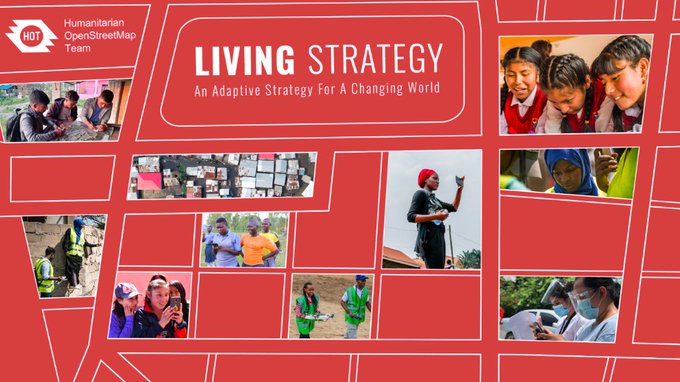During a crisis, disaster, or epidemic, maps are crucial to help save lives.
Maps can save lives, but not everywhere is mapped or has accessible maps. This is why the work that Humanitarian OpenStreetMap Team (HOT) does is so vital in crises. OpenStreetMap began in 2004 and is collective mapping – or the ‘crowdsourcing’ of geographic information.
Maps and geodata help decision-makers to respond to disasters and better allocate resources to the improvement of public health, water, sanitation, hygiene, early childhood development and education, and infrastructure, and to better reach target communities.
This week 3 Sided Cube CEO, Rich and Head of Client Success, Gabby chat with Petya Kangalova about how she is building an inclusive collective of open tech contributors to revolutionise disaster management through HOT.
Meet Petya
)
Petya joined the HOT tech team in February 2022 as Tech Collective Facilitator. She is really passionate about the impact of open mapping and using technology as an enabler for people in supporting their communities. She hopes to be able to successfully build a dynamic collective of open tech contributors from around the world!
She started her career working for the UK’s Economic and Social Science Research Council (ESRC), leading a portfolio of research programs in international development, and then transitioned into the world of open data and fell in love with the people and communities there!
HOT is committed to a world where maps and lack of data are no longer a barrier to improved lives in communities at high risk of disaster, humanitarian crises, or poverty. Petya Kangalova, Open Tech Collective Facilitator for Humanitarian OpenStreetMap Team
About Humanitarian OpenStreetMap Team
HOT is an international team dedicated to humanitarian action and community development through open mapping. They work to provide map data that revolutionises disaster management, reduces risks, and contributes to the achievement of the Sustainable Development Goals.
HOT works to ensure map data is accessible and used in decisions that save and improve lives in countries at high risk of disaster, humanitarian crises, or experiencing multidimensional poverty, making sure communities are visible on the map in the way they choose and included in decisions that affect their lives.
Their solution combines the latest technology with a global volunteer base, mapping vulnerable communities and putting data into the hands of decision-makers. With this open-source, up-to-date, free, and digital public good, information will be readily available to make better and faster decisions. As a result, missing maps will no longer be a factor in human suffering or loss of life.
They do this by:
1. Reaching those in need through maps
When major disaster strikes anywhere in the world, thousands of HOT volunteers come together online and on the ground to create open map data that enables disaster responders to reach those in need.
2. Mapping areas vulnerable to disaster
Through the Missing Maps project, the HOT global community creates maps of high-vulnerability areas where data is scarce, putting an area home to millions of people onto the world map in OpenStreetMap.
3. Expanding knowledge across partners and communities
HOT enables communities, NGOs, international organizations, and government partners to use and contribute to OpenStreetMap for locally-relevant challenges through the provision of training, equipment, knowledge exchange, and field projects.
4. Developing innovative new technology to serve the humanitarian and development communities
HOT develops open-source apps and tools for collaborative mapping and geospatial data collection. Our tools are free for all to use and leveraged by partners such as Red Cross societies, Médecins Sans Frontières, UN agencies and programmes, government agencies, and local NGOs and communities.
5. Working to support and build OpenStreetMap
All of this work is done through OpenStreetMap. OpenStreetMap is the community-driven free and editable map of the world, supported by the not-for-profit OpenStreetMap Foundation. HOT works around the globe to support and increase the use of OpenStreetMap and help build local OpenStreetMap communities.
Listen to the full episode here
To hear more of the conversation with Petya listen now using the links below!
For more things tech for good, stay tuned to our blog or shout us a holla to get in touch with us, we would love to hear from you 💚
Published on 12 May 2023, last updated on 12 May 2023
)
)
